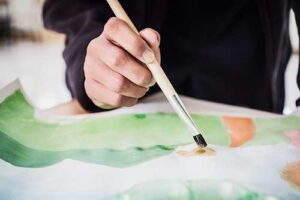Art Therapy for Addiction
Table of Contents
When most people envision an art therapy class, they see individuals standing at easels, experimenting in line, color, and texture. However, this isn’t really a complete picture of how art therapy works. We use art in many types of mental health treatments, including addiction therapy programs.
As a participant in art therapy for addiction class, you’ll learn how to explore unresolved feelings and conflicts through the creative process. Additionally, you’ll discover how to use various media types, including paint, ink, clay, and charcoal, to relieve stress and as a coping mechanism for anxiety and anger.
If you or someone you love is interested in pursuing art therapy as part of a treatment plan for addiction recovery, United Recovery Project is an excellent solution.
An Art Therapy For Addiction Program Defined

A licensed and qualified counselor, usually someone with a master’s degree, leads an art therapy session. Under their tutelage and instruction, you’ll learn how to express feelings by creating. Usually, these feelings are ones you may not feel comfortable talking about.
However, together with your art therapist, you can learn how to decode the art you create to understand yourself better and how you view the world around you. Art therapy has many benefits, including:
- Allowing you to explore your emotions
- Improving your self-esteem
- Relieving symptoms of stress, anxiety, and fear
- Helping you cope with physical or mental limitations
- Aiding you in managing your addiction
Simply sitting down at a table and molding a figure out of clay is not the same as engaging in art therapy. Rather, it’s only a single part of a much larger process.
What Happens In An Art Therapy Program For Addiction Recovery?
Most people who take part in art therapy find it quite helpful. Aside from offering a new outlet to express emotion, it also gives them a healthier way of coping other than using drugs or alcohol.
Through self-expression, clients reveal parts of themselves they may have unconsciously hidden. When these secrets emerge via analysis of their works, relief, and enlightenment are often the two most important results. Learning how to understand yourself better and your emotions are key factors to healing. It’s highly beneficial to those in drug and alcohol addiction recovery and is useful for many other situations.
In a typical psychotherapy treatment session, you’ll meet with your therapist in a comfortable, private setting to talk about your feelings and experiences. Often, you’re able to draw, paint, or otherwise create as you talk.
Your therapist will listen to what you’re saying and attempt to guide you in a meaningful way. We call this psychotherapy, and it plays a vital role in this type of treatment. By talking with a neutral individual who is neither friend nor family, you may come to realizations about yourself that you never suspected.
Find The Program Right For You At United Recovery Project
United Recovery Project is a drug and alcohol addiction treatment center that offers art therapy. When you choose to begin recovery with us, you’ll enjoy our luxury-style approach.
We provide gender-specific campuses, with males treated at one location and female clients at another. Additionally, we use an integrated treatment approach that combines evidence-based therapies with holistic options. For example, you may explore art or music therapy in the morning and cognitive-behavioral counseling in the afternoon.
United Recovery Project seeks to care for each client individually and in totality. As such, we address treatment on all levels of mind, body, and spirit. If you or your loved one is ready to begin recovery in South Florida, call us at 833.525.0166, or visit us online to read more about our services.
Art Therapy For Addiction Program Locations
Florida, New York, New Jersey, Pennsylvania, Ohio, Georgia, Massachusetts, Minnesota, Illinois, Tennessee, Oklahoma, Louisiana, Maine, California, Nevada, and Colorado.
- Addiction Therapy Programs
- Cognitive Behavioral Therapy (CBT) for Addiction
- Psychotherapy for Addiction
- United Recovery Project Family Group
- Music Therapy for Addiction
- Life Skills Training for Addiction
- Holistic Therapy for Addiction
- New Jersey Equine Therapy for Addiction
- Art Therapy for Addiction in New Jersey
- Equine Therapy for Addiction in New York
- Art Therapy for Addiction in New York
- Equine Therapy for Addiction in Florida
- Art Therapy for Addiction In Florida
- Psychotherapy for Addiction
- Nutrition Therapy for Addiction
- Music Therapy for Addiction
- Life Skills Training for Addiction
- Holistic Therapy for Addiction
- Group Therapy for Addiction
- Equine Therapy for Addiction
- Art Therapy for Addiction
- Animal-Assisted Therapy
- 12-Step Facilitation Therapy
- Motivation Therapy for Addiction
- Dialectical Behavior Therapy (DBT) for Addiction
- Cognitive Behavioral Therapy (CBT) for Addiction
